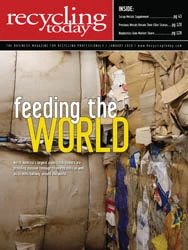There have long been aspects of the scrap recycling industry that are not easily understood by those new to the industry or by those who observe it for only a short time.
Scrap recyclers pay their customers in a “reverse retail” model that can seem out of the ordinary to the uninitiated. And a circular full of unusual, alphabetically diverse terms may seem unclear to someone new to the industry, while long-time traders sling the terms around with great familiarity.
In addition to the terminology, increasingly the manufacturing or “demanufacturing” processes used by scrap recyclers also involve methods and technologies not easily explained to first-time observers.
A background in the sciences has always been helpful from a metallurgical perspective in the scrap industry. But the identifying, sorting and separating equipment now used at scrap yards involves an advanced understanding of chemistry and magnetic properties.
It is more difficult for this one scrap industry observer to simplify the scrap processing industry—as one recycler did for me more than one decade ago—to be the business of turning large pieces of junk into smaller pieces of junk. (Actually, the word he used was even less polite than “junk.”)
A wide number of chemical, spectrographic, X-ray and magnetic processes are now deployed at scrap yards that do a lot more than simply chop larger objects into smaller ones.
Instead, this equipment essentially refines and purifies the stream of mixed materials to obtain impressive desired levels of purity and chemistry.
Scrap yards still have their share of unattractive auto hulks arriving at the gate and piles of metal that neighboring property owners probably suspect hold very little value.
For an industry that is still referred to as a “junk” industry by its detractors, the level of sophistication has instead increased the value of those piles of metal in an evolutionary process that is ongoing.

Explore the January 2010 Issue
Check out more from this issue and find your next story to read.
Latest from Recycling Today
- Nucor receives West Virginia funding assist
- Ferrous market ends 2024 in familiar rut
- Aqua Metals secures $1.5M loan, reports operational strides
- AF&PA urges veto of NY bill
- Aluminum Association includes recycling among 2025 policy priorities
- AISI applauds waterways spending bill
- Lux Research questions hydrogen’s transportation role
- Sonoco selling thermoformed, flexible packaging business to Toppan for $1.8B





